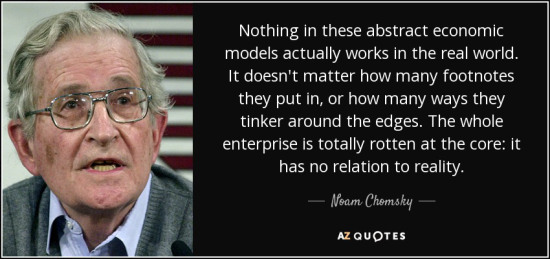Krugman on models (II) Last year Alex Rosenberg — chair of the philosophy department at Duke University and renowned economic methodologist — had an interesting article on What’s Wrong with Paul Krugman’s Philosophy of Economics in 3:AM Magazine: Krugman writes: ‘So how do you do useful economics? In general, what we really do is combine maximization-and-equilibrium as a first cut with a variety of ad hoc modifications reflecting what seem to be empirical regularities about how both individual behavior and markets depart from this idealized case.’ But if you ask the New Classical economists, they’ll say, this is exactly what we do—combine maximizing-and-equilibrium with empirical regularities. And they’d go on to say it’s because Krugman’s Keynesian models don’t do this or don’t do enough of it, they are not “useful” for prediction or explanation. When he accepts maximizing and equilibrium as the (only?) way useful economics is done Krugman makes a concession so great it threatens to undercut the rest of his arguments against New Classical economics: ‘Specifically: we have a body of economic theory built around the assumptions of perfectly rational behavior and perfectly functioning markets.
Topics:
Lars Pålsson Syll considers the following as important: Economics
This could be interesting, too:
Lars Pålsson Syll writes Schuldenbremse bye bye
Lars Pålsson Syll writes What’s wrong with economics — a primer
Lars Pålsson Syll writes Krigskeynesianismens återkomst
Lars Pålsson Syll writes Finding Eigenvalues and Eigenvectors (student stuff)
Krugman on models (II)

Last year Alex Rosenberg — chair of the philosophy department at Duke University and renowned economic methodologist — had an interesting article on What’s Wrong with Paul Krugman’s Philosophy of Economics in 3:AM Magazine:
Krugman writes: ‘So how do you do useful economics? In general, what we really do is combine maximization-and-equilibrium as a first cut with a variety of ad hoc modifications reflecting what seem to be empirical regularities about how both individual behavior and markets depart from this idealized case.’
But if you ask the New Classical economists, they’ll say, this is exactly what we do—combine maximizing-and-equilibrium with empirical regularities. And they’d go on to say it’s because Krugman’s Keynesian models don’t do this or don’t do enough of it, they are not “useful” for prediction or explanation.
When he accepts maximizing and equilibrium as the (only?) way useful economics is done Krugman makes a concession so great it threatens to undercut the rest of his arguments against New Classical economics:
‘Specifically: we have a body of economic theory built around the assumptions of perfectly rational behavior and perfectly functioning markets. Any economist with a grain of sense — which is to say, maybe half the profession? — knows that this is very much an abstraction, to be modified whenever the evidence suggests that it’s going wrong. But nobody has come up with general rules for making such modifications.’
The trouble is that the macroeconomic evidence can’t tell us when and where maximization-and-equilibrium goes wrong, and there seems no immediate prospect for improving the assumptions of perfect rationality and perfect markets from behavioral economics, neuroeconomics, experimental economics, evolutionary economics, game theory, etc.
But these concessions are all the New Classical economists need to defend themselves against Krugman. After all, he seems to admit there is no alternative to maximization and equilibrium …
So even if the core assumptions in mainstream economics — in this case equilibrium and maximization — are false, we can always ‘save’ our pet model by shrinking the domain of applicability and turn up with a more restricted model that — lo and behold — is true. People are perfectly rational and act on perfect markets given that …
In the case of Krugman the usual neoclassical macroeconomics works just fine in general, but in the special case when it doesn’t — at the zero lower bound — we have to turn to ‘Keynesian’ macroeconomics. Very handy flexibility indeed! And what a lovely way to immunize the prefered modeling framework and not having to even consider the possibility of alternative (heterodox) theories and models …
When the given that becomes a very large set, shrinking the domain of applicability, one may, of course, wonder what is the point of having theories and modeling things at all.
With ever more spatio-temporal auxiliary assumptions, the information that the model-derived theorems contain approaches zero.
Models and theorems that do not provide information are useless. The enterprise of constructing ever more of that kind of thought experiments is, as Chomsky has it, ‘totally rotten at the core.’
